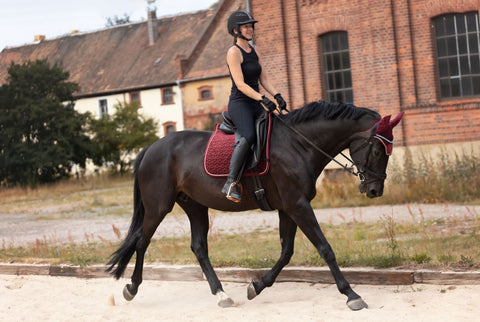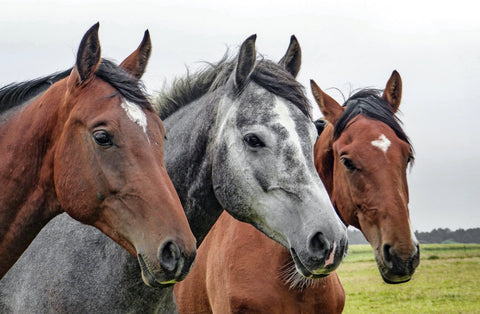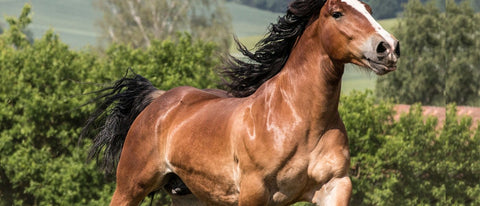
Florian ist aufgewachsen auf einem Bauernhof. Umgeben von Pferden, entdeckte er früh seine Faszination für diese majestätischen Tiere. Inspiriert von seiner reitbegeisterten Mutter, entwickelte er das Nahrungsergänzungmittel - Pferdegold. Seine tiefe Verbundenheit zur Natur und die leidenschaftliche Hingabe zu Pferden trieben ihn an, sein Unternehmen zu gründen.
What happens when you exert yourself physically? You sweat. Add the summer heat to the mix and the whole thing quickly becomes a veritable sweat parade .
Horses are no different; they too melt away in the heat of battle. Sweating is actually a wonderful invention of nature, as it cools the overheated body.
The problem: What then trickles down isn't just water. When you sweat, your body also loses vital electrolytes – and if these aren't replaced, things can quickly get dangerous. Here's everything you need to know in a nutshell:
What are electrolytes anyway?
Electrolytes are mineral salts dissolved in water or blood. These include the minerals magnesium, potassium, calcium, and sodium . Since these cannot be produced by the body itself, they must be obtained from outside, i.e., through food.
What's special about horse sweat is that it contains four times more mineral salts than humans. This means that when horses sweat, they also lose significantly more electrolytes.
What are electrolytes responsible for?
Whether it's nerve and muscle functions or fluid exchange in the tissue: electrolytes are literally involved everywhere.
On top of that, these multitalents are also responsible for regulating the acid-base balance – and ensure, for example, the correct pH value in the blood.
Do horses sweat more than humans?
Yes! According to a study, horses sweat faster than humans. They heat up up to ten times faster.
Michael Lindinger , a professor at the University of Guelph in Canada, explains: "In hot, humid weather, just 17 minutes of moderate-intensity exercise is enough to raise a horse's temperature to dangerous levels."
The reason: Horses are larger and have more muscles. When these muscles are used during training, they generate a lot of heat. And what does a heated body do to return to normal temperature? It sweats!

How many electrolytes does a horse lose?
How much electrolyte a horse loses depends on various factors: the outside temperature, humidity, intensity of training, etc. It is said that a horse loses about one liter of sweat per hour at temperatures as low as 20 degrees Celsius.
In particularly strenuous events such as endurance riding, this is even more important. Here, up to 35 liters of sweat can be lost per ride – and that corresponds to approximately 300 grams of minerals. During a competitive ride, that's still up to 20 liters of water and 200 grams of minerals.
What are the consequences of electrolyte deficiency?
If a horse lacks electrolytes, this is not without consequences. Performance suffers, but kidney dysfunction and diarrhea can also occur.
A severe electrolyte deficiency can quickly become life-threatening. Possible consequences include kidney failure, cardiac arrhythmia, cardiovascular failure, colic, etc.
Symptoms of electrolyte deficiency
- Performance decline
- Muscle tension
- Pale mucous membranes
- apathy
- Vary
This is what you should or shouldn't do!
Important: Please never use a cooling blanket!
First order of business: Move the sweating horse into the shade. Then cool it down several times with cold water.
Also important: Scrape off any excess water. Otherwise, the water would be trapped in the coat and quickly warm up. This way, you can cool your horse by two degrees in 10 minutes.
First electrolytes, then water!
After a strenuous summer workout, it's time for a big drink of water. And then everything's fine, right? Unfortunately, it's not that simple. Quite the opposite: According to Professor Lindinger, this can quickly become counterproductive.

If a horse that is sweating heavily drinks a lot of water all at once, the water dilutes the body fluids. The electrolytes are distributed over a larger blood volume. As a result, the electrolyte content in the blood drops further, and the body tries to get rid of even more water and electrolytes.
The logical consequence: You cannot avoid administering an electrolyte supplement!
Important: After administering electrolytes, water should also be given. The reason: Electrolytes are salts – and salt makes you thirsty. Without a sufficient supply of water, your horse could quickly become dehydrated.
Salt lick – yes or no?
A salt lick isn't a bad idea in principle—but unfortunately, it's only half the battle. While they usually contain chloride and sodium, they're usually lacking the important minerals magnesium, potassium, and calcium.
When should you add electrolytes?
You should give your four-legged friend an extra dose of electrolytes in the following situations: heat, high humidity, strenuous physical activity, sweating, diarrhea, and stress.

Pferdegold® Electrolytes
The Pferdegold Electrolytes dietary supplement provides a balanced blend of electrolytes and helps compensate for electrolyte losses caused by excessive sweating, especially in summer during high temperatures or during intense physical exertion.
Order now
















